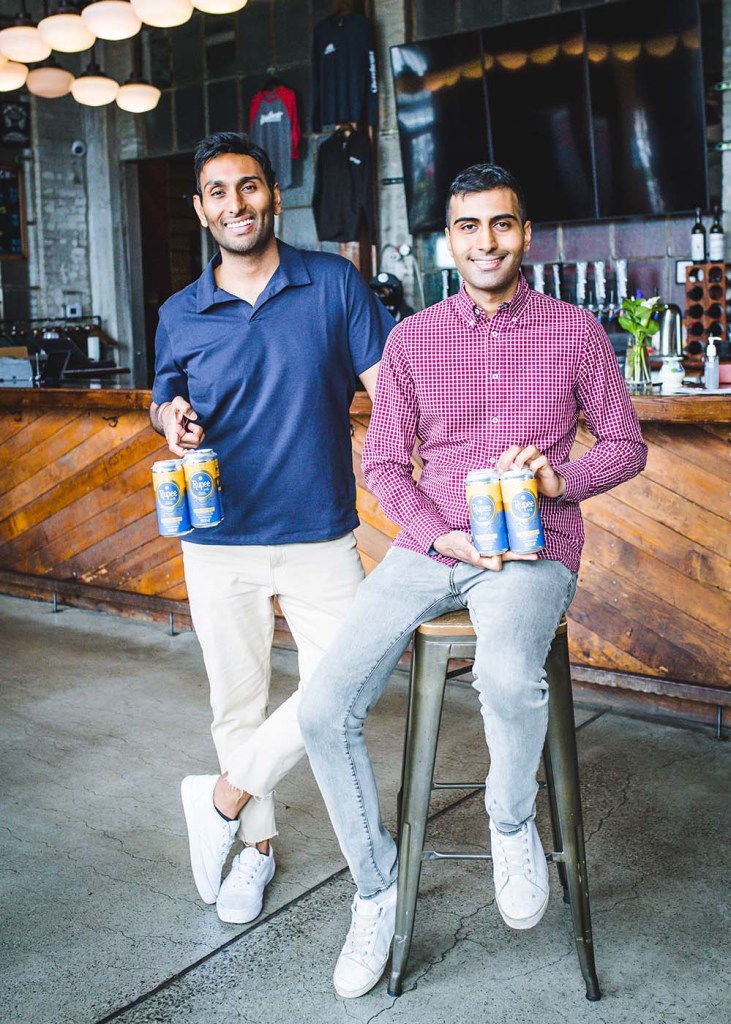Growing up, Van Sharma envisioned himself working a job that dealt with diplomacy, not marketing alcohol (although it’s safe to say the two do intersect in plenty of ways).
“I hated everything in school, aside from current affairs, world politics — those types of things are always really fascinating for me,” he says. “And being Indian, you’re supposed to be really good at math, and you’re supposed to love science. And I didn’t like any of those things.”
Sharma’s childhood gave him a good foundation for international work; he was born in London and grew up there until, as he puts it, his family took a fateful vacation to America and ended up in Maine, a state they had never heard of.
“They ended up randomly just changing their lives and moving to Portland, Maine, where my dad went on to open the state’s first Indian restaurant, Bombay Mahal,” he says.
He grew up helping out at the family business — catering events, waiting tables, even stealing the occasional beer for resale to friends.
“I was always really fascinated with the beverage side and seeing all those interesting brands and beers,” Sharma says. “One thing I noted was that all these Indian beers that were available in the market were never able to sell in Maine, because it was the 1990s and distributors just said, ‘hey that’s such a random request to ship and distribute Indian beer in a very homogenous state like Maine.’ There wasn’t much appetite, and zero to little diversity.”
Looking back, that might have been the first sign that Sharma wanted to shake things up. But he followed his original dream and earned a master’s degree in international relations.
“I was trying to move to Washington, D.C., and I kept applying and kept applying and nothing. I was finding it so hard to get a job at the World Bank or government agencies or specific embassies. And I was like you know what, I’m just gonna take the first job offer that I get. And it happened to be in London, where I was born. So essentially for eight years I had a career working in different sales environments. And that led to having a startup, which I eventually exited” he says.

And then, Covid-19 hit. Sharma and his brother Sumit, who was living in Australia at the time, went back to Maine to help the family restaurant navigate the world of hospitality during a pandemic.
“I noticed the same problem basically pop up again, where these [foreign] beer companies just weren’t sending beer to America because of the supply chain disruption,” Sharma says. “So all these old customers that have been around for decades are like, ‘hey, where’s the Taj Mahal beer, or where can I get Kingfisher?’ And we just didn’t have those options available. And there are tons of great microbreweries in Maine, but it got us thinking that we should do something and come up with a better product than the very traditional legacy brands from India. And one that’s made for the food we grew up with,” he continues.
And thus, Rupee Beer was born.

The brothers recruited British-American craft brewing consultant Alan Pugsley (Sharma says he’s often called the Johnny Appleseed of craft brewing) to help them get started.
“The fact that he’s British was huge, because English people love beer, but they also equally love Indian food,” he says. “Chicken Tikka Masala is the national dish of England. So he understood exactly what we’re hoping to do.”
One of the most important factors? Creating a beer with lower-than-normal levels of carbonation. There are two reasons for this, according to Sharma.
“The worst thing you can do if you’re at an Indian restaurant is take mass-produced gassy beer and pair it with something that’s really heavy, like butter chicken (which happens to be Sharma’s favorite dish to enjoy a Rupee with),” he says. “So we brought the levels of carbonation down to alleviate a lot of that indigestion.”
Secondly, they wanted to appeal to the “auntie crowd” of mature Indian women by creating an easy to drink beer with a super smooth finish. They do this by using a slow brewing method and incorporating ingredients like basmati rice and three types of hops.
“We wanted it to be a beverage that non-beer drinkers perhaps could be converted to,” Sharma says. “So people like our mom or an Indian auntie. We’re a mission driven company and we want to bring Indian craft beer to the world.
At the moment, beer from the fast-growing company is available in roughly a dozen U.S. markets including New York. Rupee Beer is stocked at select Costcos, Trader Joe’s, Whole Foods and Total Wines. In New York City, it can be found at Craft & Carry, as well as restaurants Madam Ji, Honest Indian, Inday, Mughlai Indian, Aroma Indian, Taco Mahal, Rang, Imli and Rasa Grocery. Along with Epicenter, Rupee Beer is also one of the sponsors of the coming New York Indian Film Fest, where the beer will be available for purchase.











Had them in NJ at an Indian wedding recently. Not just a beer for Indian curry but also a crushable beer. great story gents. Is it available in Whole Foods in Manhattan? Nigerians love light lagers